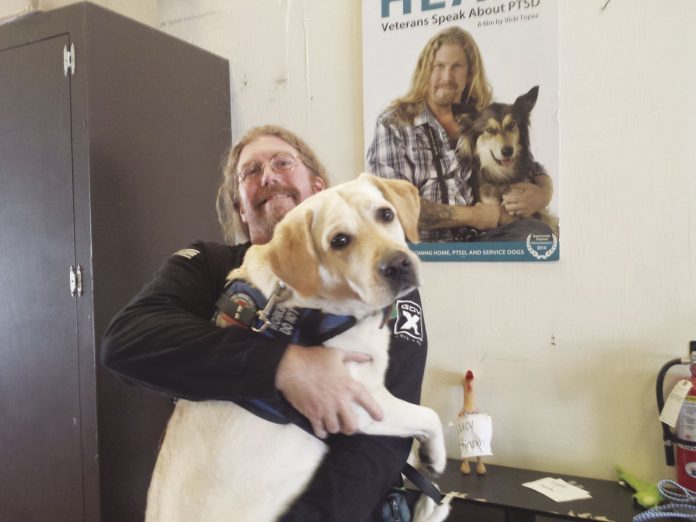
A service dog operation that helps veterans with combat-related mental and physical trauma and has been lauded nationwide is now battling county planners for an expansion to help even more vets.
Operation Freedom Paws and its award-winning founder, Mary Cortani, have tried for two years to get approvals for the San Martin-based nonprofit, first to open and now to house more dogs, through the county’s review process.
And while the Santa Clara County Planning Commission has been supportive and the initial process was streamlined to help the organization, Cortani says the more recent process at the staff level has been fraught with delays, expensive and redundant studies and uncompromising demands.
That has undermined efforts by OFP to help more vets and disabled clients who are paired and trained with service dogs, according to Cortani, her staff and supporters.
“We want to help everybody,” said Jeff Wilson, 48, an Iraq war veteran who returned with PTSD and other injuries and was referred by a veterans’ counselor to Cortani five years ago for help. He now helps other vets and their dogs as a mentor/trainer at OFP.
“When you need help, you need help and waiting can be a nightmare,” said the Hollister resident.
“We know first hand what we can do for PTSD and have the facilities to do it, and for someone sitting in an office to say ‘no’ for what seems like no reason, it’s really frustrating and it hurts,” said Wilson.
Possible solution
Cortani said she “gets it” that planners have to make sure things are safe and that the rules are followed in granting final approval of her conditional use permit and an expansion from 70 to 250 dogs allowed on the premises, which she believes can easily accommodate 1,000.
“But the community and those that support us, our staff and our clients, they can’t believe that the county isn’t willing to [be more helpful]. They say to me, ‘Where is the logic?’”
She added, “We are dealing with people and dogs where safety is of the utmost importance; we are dealing with mental health issues and the well-being of people who have been treated badly by other government agencies and who are struggling to live life just like you and I do.”
But in a surprise development Tuesday, Kirk Girard, Director of Santa Clara County’s Department of Planning and Development, said he and others at the county have discussed a possible solution to OFPs money problems.
He said that the nonprofit’s growth and need for more dogs has triggered modifications in its original use permit that will require some expensive work to comply with traffic and other issues. One of those involves upgrades, such as a turning lane on Llagas Avenue.
“We can’t look the other way for anybody if you trigger the standards for traffic improvements,” Girard said.
To assist OFP, the county has already agreed to bill them only for time and materials used in processing their permit modifications, rather than flat fees that can be in the thousands of dollars, according to Girard.
Costly improvements
He opined that OFP’s problem really is one of finding the money needed for improvements that are now required to be in compliance because they crossed a threshold in the number of dogs on the premises.
And he offered a possible solution never before discussed with OFP, a grant from the county.
“It may be that the county could potentially help support this, God knows they are providing an essential service to vets,” Girard said.
“We do pay a lot of money for veterans programs and there are a lot of public-private partnerships,” he said, adding, “Is there a way for a grant to pay for infrastructure support?”
Things have to be done according to county rules, but the county is willing to help as much as it can and to explore possibilities such as a veterans-related grant, according to Girard.
“They are exceeding the current permit and we need to work as quickly as we can to get them the permit coverage they need. I am prepared to bend over backwards on the permits process,” Girard said.
At issue most recently has been allowing more dogs on the property than were initially approved by the county, at a time when the county also required reports on whether the operation was complying with its original conditional use permit.
The most recent report found it was not, but Cortani said she disagreed with the staff’s finding of four areas of noncompliance.
One area that was true was that OFP had exceeded by about a dozen the number of dogs allowed on the property at any given time, she said.
Frustration
The planning staff claims of noncompliance in what Cortani considers minor issues, however, triggered what amounts to a requirement that OFP start from the beginning a new permitting process, with all its attendant costs, she said. She added that she can hardly contain her frustration and has not shared much about the problem with her staff.
The facility houses both nonprofit and for-profit parts of the overall operation. The nonprofit trains service dogs and pairs them with veterans and other disabled people. It has been honored by CNN, the Red Cross and others and enjoyed robust support from the public. The for-profit operation is a traditional kennel that offers daycare and extended stay and training for paying customers.
Proceeds from the paying customers are pumped into the nonprofit, so the more traditional kennel business that is done the more that can be done to help veterans and others who are assisted by the nonprofit, according to Cortani.
Right now, about 50 vets and disabled clients are in training at OFP, with as many as four sessions a week for some.
The waiting list for dogs and training is more than 130 names long, according to Cortani, most veterans from all eras.
The operation employs 12 people, four of whom are veterans.
Noise, traffic studies
With help from donors and a $1 per year rent deal with Recology South County, its neighbor, the OFP staff has turned an unused complex of warehouses and weed-choked grounds into a showcase kennel and training facility.
It abuts Recology’s noisy garbage transfer station to the north, a sprawling auto wrecking yard across the street to the west, a creek to the east and a small orchard and residence to the south. In addition, noisy light aircraft from the county’s nearby San Martin Airport are constantly flying overhead.
Only one person has ever complained, a resident who lives 1,000 yards away and doesn’t like to hear dogs bark, Cortani said.
In response, county animal control officers have three times monitored for barking noise at the person’s property but have heard none, according to OFP marketing and human resources director Megan Wenholz and Deb Blanchard, director of kennel operations.
Still, the county has demanded to date three different noise studies as well as a traffic study, and is requiring major improvements to the driveway to meet current codes. It all drains funds that could be used to help vets, Cortani and her supporters say.
And the county now is requiring that OFP use experts of its choice, which means Cortani cannot get such services donated by supporters, as she has done in the past, she said.
Cortani is reluctant to implement improvements such as the driveway upgrades or install a donated flagpole and flag because she doesn’t know whether the county ultimately will approve her expansion request. So, expansion plans are on hold for now while OFP deals with the demands of the county bureaucracy and regulations.
So far, permits, application fees and study fees have drained nearly $20,000 and studies another $15,000 from the nonprofit’s potential income, and more costs are expected. They include upwards of $60,000 to bring the driveway into compliance with current codes.
Powerful support
Rob Oneto, a principal at the Gilroy office of Ruggeri-Jensen-Azar land planning engineers, and his partner Arminta Jensen, are two of OFP’s biggest supporters.
They have donated their time and expertise to help Cortani navigate the county review process and it has not been easy, said Oneto.
“If you are not used to the government process for getting approval for such things it can be devastating, it’s a very difficult process, almost insurmountable if you are not experienced, that is why we help,” Oneto said.
And because of OFP’s mission, he said.
“Their primary mission is for veterans and it’s a very worthy cause. They are homegrown, and to see any organization like that struggle just tugs at your heart.”
Oneto, who deals routinely in his job with city and county planning staffs, said nothing is being asked of OFP that is not asked of other applicants. But the process could have been simpler, he said.
Cortani’s efforts have the support of the San Martin Advisory Committee and the county planning commission. Roland Velasco of County Supervisor Mike Wasserman’s staff has also helped, Oneto said.
He offered a partial list of other donors of money or services, including some who will help with the expensive driveway improvements.
Among them have been contractor Joe Giacalone, Michael Davis of DZ Design, Glen Loma Ranch and homebuilders CalAtlantic and Brookfield Homes, according to Oneto.
Cortani said she is grateful for the help, that it has allowed OFP to continue to help veterans while it addresses the county’s demands.
Of Oneto and his help, she said, “I can’t say enough good things about him.”
For more about OFP and to donate, go to: bit.ly/1xmPHGq.














